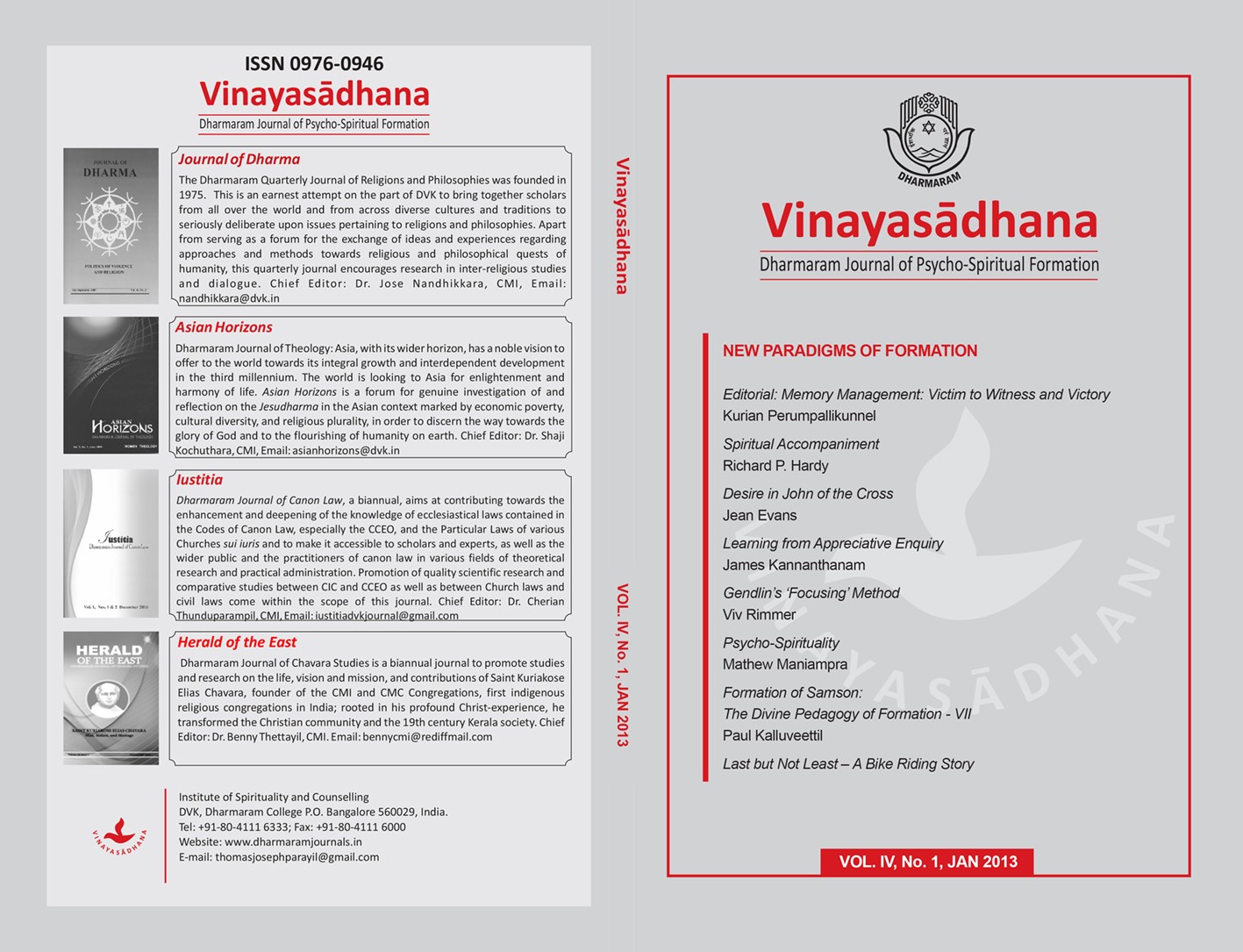Psycho-Spirituality
Tensions, Conflicts, and Complementariness
Keywords:
Psycho-Spirituality, Tensions, Complementariness, Conflicts, psychological problems, personality, FormationAbstract
Mind is not something that hangs in the air. It is essentially related to the interior realm of human being that is the soul. Mind is essentially related to the spiritual self and consciousness. Boundaries of mind and spirit overlap, so much so, it is not easy to clearly state where the soul begins and where the mind ends. Reductionism is untenable and has done havoc to the human nature. The alternative is a synthesis of psychological and spiritual elements. Some psychological problems are deeply related to the spiritual self. By touching the root of human personality, changes in the personality can be affected rather easily. One’s spiritual nature is a psychological fact. It is the real and transformative force that empowers one’s life. Formation should involve the whole person and every aspect of personality shall be synthesized to the core. Emotion is a key element in our personality. Everything else faces serious threat if emotions are not integrated properly. Wholeness occurs when both psychological principles and spiritual principles come together and support each other and hence we speak of Psycho-Spirituality
References
Assagioli, R. (1971). Psychosynthesis. New York: Viking Press.
Benner, D. (1988). Grand Rapids: Michigan: Baker Book House.
Cornelissen, R. M., Varma, & Misra (2011). Foundations of Indian Psychology, Vol. 2. Noida: South Asia: Pearson.
Cortright, B. (1997). Psychotherapy and Spirit. New York: State University Press
D’ Almeida, M. E. (2007). Dynamics of an Integrated Formation Model.
Sanysas Journal of Consecrated Life, 2 (2): 155-167.
Delitzsch, F.P. ( 1977). A System of Biblical Psychology. Grand Rapids: Baker.
Ehrenwald, J. (1966). Psychotherapy: Myth and Method. New York: Grune & Stratton
Frankl, V.( 1975). The Unconscious God. New York: Simon & Schuster.
Frankl, V. (1978). The Unheard Cry for Meaning. New York: Simon & Schuster.
Freud, S. (1926). The Question of Lay Analysis. In the standard edition of the complete psychological works of Sigmund Freud, trans, and ed. J. Strachey, vol.20. London: Hogarth.
Howard, P. (2006). A Psycho-Spiritual Model of Spiritual Formation: A review of David Benner’s contributions. CEJ: Series.3. (2) 230-239.
Jung, C. G. (1955). Modern Man in Search of a Soul. New York: Harcourt, Brace and Ward
Kay, W. & Weaver, P.C. (1997). Pastoral Care and Counseling. Hydrebad: Authentic Books.
Kelsey, M.T, (1988). Christo-Psychology. New York: The Cross Road Publishing Company.
Ladd, G. (1974). A Theology of the New Testament. Grand Rapids: Erdmans.
Leech, K.( 1977). Soul Friend. San Francisco: Harper & Row.
Maniampra, M. (2001). A Spiritual Vision to Wholeness. Bangalore: Dharmaram Publications.
Maniampra, M. (2011). Formation as Psychospiritual Integration. Vinayasadhana. Vol.III (1) 12-28.
McDonald, H.D. (1981). The Christian View of Man. Westchester: Good News
Oden, T. C. (1972). The Intensive Group Experience: The New Pietism. Philadelphia: Westminster.
Otto, R. (1923). The Idea of the Holy. London: Oxford University Press.
Pastores Dabo Vobis. (1992). Post Synodal Appostolic Exhortation of John Paul II on the formation of priests in the circumstances of today.
Pattison, E. M. (1979). Social and Psychological Aspects of Religion in Psychotherapy. Insight (Fall) 29-31.
Sharf, R. S. (2004). Theories of Psychotherapy and Counseling. Belmont, CA: Brooks/Cole.
Szasz,T. (1961). The Myth and Mental Illness. New York: Harper & Row.
Tournier, P. (1963). The Strong and the Weak. Philadelphia: West Minister
Tyrrell, B. J. (1982). Christotherapy II, New York: Paulist Press.
Wilber, K. (2007). Integral Spirituality. Boston : Integral Books


